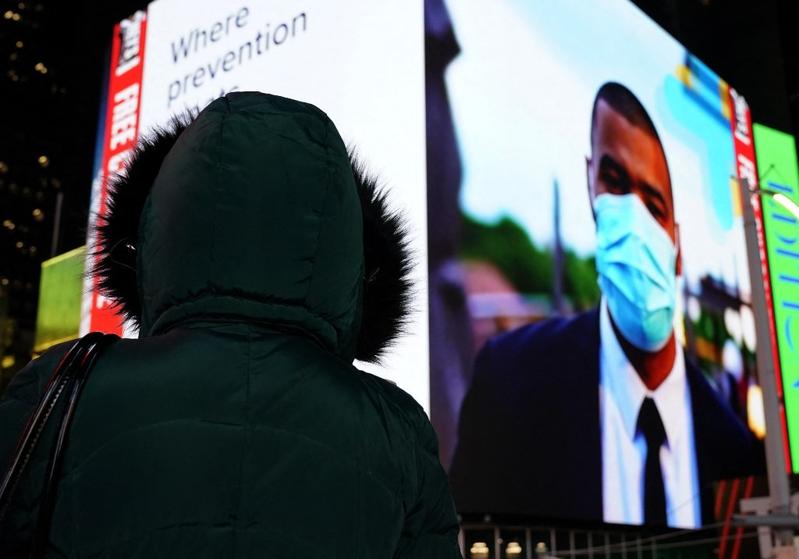 A person looks at a billboard showing a man wearing a mask in Times Square, New York, Jan 21, 2022. (TIMOTHY A CLARY / AFP)
A person looks at a billboard showing a man wearing a mask in Times Square, New York, Jan 21, 2022. (TIMOTHY A CLARY / AFP)
LISBON / NAIROBI / DAR ES SALAAM / NEW YORK / LONDON / WARSAW- The toll of the COVID-19 pandemic was reflected in a natural decrease last year in the population of nearly three-quarters of US counties versus the two previous years, the census bureau said on Thursday.
More than 73 percent of US counties experienced natural decrease, or an excess of deaths over births, up from 55.5 percent in 2020 and 45.5 percent in 2019, bureau data showed
More than 73 percent of US counties experienced natural decrease, or an excess of deaths over births, up from 55.5 percent in 2020 and 45.5 percent in 2019, bureau data showed.
"In 2021, fewer births, an aging population and increased mortality – intensified by the COVID-19 pandemic - contributed to a rise in natural decrease," the US Census Bureau said in a statement.
The biggest loss, of 159,621 residents, was in Los Angeles county in California, according to the data released by the bureau, as part of its Vintage 2021 estimates of population and components of change.
All counties in Delaware, Maine, New Hampshire and Rhode Island experienced natural decrease in 2021, it added, while migration also led to a decline in population for some.
READ MORE: A third of US COVID-19 cases now caused by Omicron BA2
The fall continues a trend in which more than half of all US counties lost population over the decade from 2010, with almost all growth taking place in metropolitan areas, census officials said last August.
Between 2020 and 2021, population increased in about 65 percent of metropolitan areas within the 50 US states and the District of Columbia.
The US population grew at a slower pace in 2021 than any other year on record as the COVID-19 pandemic worsened the more subdued growth of recent years, the bureau has said.
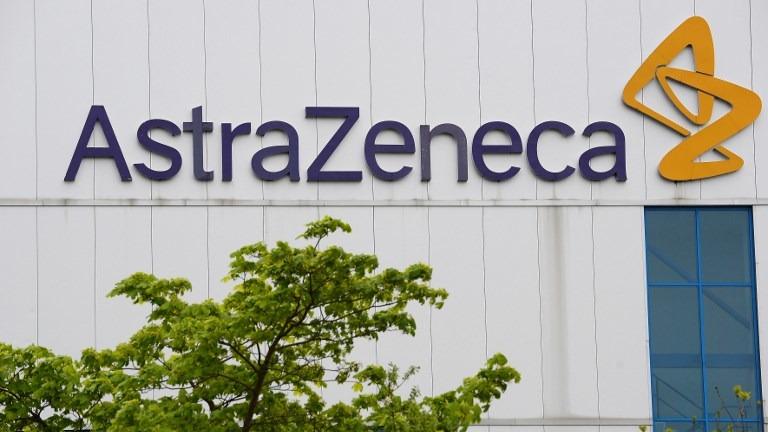 This May 8, 2014 photo shows British pharmaceutical company AstraZeneca's manufacturing site in Macclesfield, northwest England. (ANDREW YATES / AFP)
This May 8, 2014 photo shows British pharmaceutical company AstraZeneca's manufacturing site in Macclesfield, northwest England. (ANDREW YATES / AFP)
AstraZeneca
Europe's drug regulator is expected to give the go-ahead this week for AstraZeneca's antibody-based injection for preventing COVID-19 infections, two people familiar with the review said, following US and UK approvals.
The treatment is meant for adults whose immune system is too weak to respond to vaccines and offers a new tool to ease the pandemic burden on healthcare systems. Infections in Europe are on a sharp rise again this month, with the adult vaccination rate stagnating at a little over 83 percent
The treatment is meant for adults whose immune system is too weak to respond to vaccines and offers a new tool to ease the pandemic burden on healthcare systems. Infections in Europe are on a sharp rise again this month, with the adult vaccination rate stagnating at a little over 83 percent.
The expected recommendation by the European Medicines Agency is set to be confirmed swiftly by the European Commission, which has the final word on market access.
An EMA expert panel on drug assessment is due to discuss AstraZeneca's Evusheld treatment this week, according an agenda posted on the EMA's website.
The EMA, which started its real-time review of Evusheld last October, said if the panel came to a conclusion this week, it would communicate its opinion towards the end of this week.
It said on Thursday the review would conclude within weeks and that AstraZeneca's data was robust.
AstraZeneca, whose COVID-19 vaccine Vaxzevria is primarily being used outside the EU and the United States, declined to comment.
Britain's medicines regulator approved Evusheld last week. It is given as two consecutive shots in arms.
The US Food and Drug Administration, meanwhile, in December issued an emergency use authorization for Evusheld, which is also known as a passive immunization.
The European Commission in October included Evusheld in a list of the 10 most promising candidates for an EU portfolio of COVID-19 treatments, but the bloc has so far not struck a purchase agreement.
The World Health Organization warned last week the pandemic was far from over, citing the highly transmissible Omicron variant and its BA.2 sub-variant as well as the lifting of restrictive measures.
AstraZeneca said in December a lab study had found Evusheld retained neutralizing activity against Omicron.
While vaccines rely on an intact immune system to develop targeted antibodies and infection-fighting cells, Evusheld contains lab-made antibodies designed to linger in the body for months to contain the virus in case of an infection.
The therapy was found to cut the risk of developing symptomatic COVID-19 by 77 percent in trials, with protection lasting for at least six months. It has also been shown to prevent disease progression when given soon after infection.
One of the sources also said the EMA's ongoing review of Lagevrio, an oral treatment by Merck & Co and Ridgeback Biotherapeutics to prevent a COVID-19 infection from getting worse, was unlikely to be concluded before the end of April.
The EMA said last week it was difficult to predict how long that review would take. Merck did not immediately respond to a request for comment.
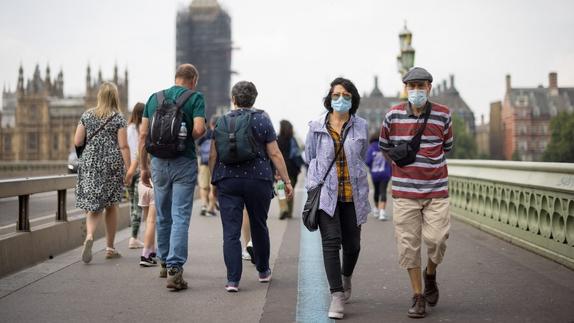 Pedestrians wearing face masks cross Westminster Bridge with Elizabeth Tower in central London on July 26, 2021. (TOLGA AKMEN / AFP)
Pedestrians wearing face masks cross Westminster Bridge with Elizabeth Tower in central London on July 26, 2021. (TOLGA AKMEN / AFP)
Britain
It is wrong to assume that the virus will inevitably continue to become milder, a British scientist has said.
"There has been a view put out in the media that this is inevitable, that the direction of travel is inexorably towards mildness. That's complete rubbish," Simon Clarke, a microbiologist at the University of Reading, told Xinhua in an interview on Monday.
"It just happens to have happened that way with omicron. That doesn't mean it's going to be constantly heading in that direction. It could easily turn around," said the associate professor specializing in how humans interact with infectious diseases.
Clarke made the remarks after more than 500,000 new cases, mainly of the omicron variant, were reported in Britain last week.
Official figures on Tuesday showed Britain added 592,459 COVID-19 cases and 836 deaths over the last seven days, bringing the national counts to 20,413,731 and 163,929 respectively.
"The finding of over half a million cases, principally of omicron in the UK doesn't really surprise me," said Clarke.
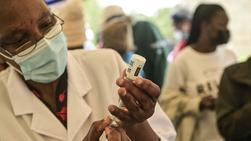 A healthcare worker prepares a dose of Moderna COVID-19 vaccine, during a mass vaccination in Nairobi, on Dec 16, 2021. (SIMON MAINA / AFP)
A healthcare worker prepares a dose of Moderna COVID-19 vaccine, during a mass vaccination in Nairobi, on Dec 16, 2021. (SIMON MAINA / AFP)
Kenya
Kenya will destroy 840,000 Astrazeneca vaccine doses following their expiry on Feb 28, Mutahi Kagwe, the cabinet secretary for the Ministry of Health, said on Wednesday in Nairobi.
The vaccines are part of the 2.2 million doses Kenya received as a donation through the COVAX facility in January and had been distributed across the country.
Kagwe blamed the expiry on complacency among Kenyans and growing vaccine hesitancy.
"Astrazeneca has particularly had unique challenges. There has been complacency by Kenyans in taking up the jab following reduction in positivity rate and COVID-19 admissions. The daily vaccination rate has reduced from 252,000 recorded in early February to 30,000-40,000 daily," said Kagwe.
He further noted that preference of certain types of vaccines by Kenyans has led to decreased administration of Astrazeneca jabs.
"We continue to witness vaccine hesitancy due to misinformation and rumors especially around fertility issues," he added.
Going forward, he said, Kenya will only receive vaccine donations of doses whose shelf-life is at least four months from the day they are received.
Across Africa, expiry of vaccines has also been reported in Uganda, Malawi, Senegal and Nigeria.
Kenya has so far received some 27 million vaccine doses of Astrazeneca, Moderna, Pfizer, Sinopharm and Johnson& Johnson brands and administered 17.4 million of them, according to Kagwe.
Eight million people have been vaccinated fully with total COVID-19 cases standing at 323,319.
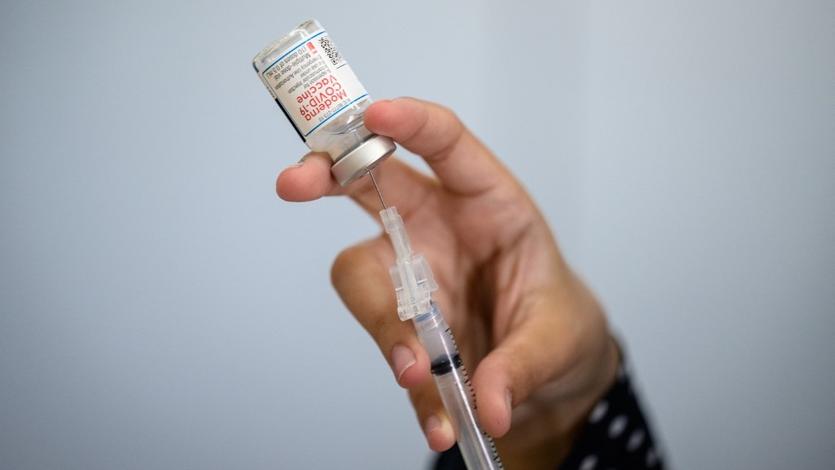 In this file photo taken on April 16, 2021 a medical staff member prepares a syringe with a vial of the Moderna COVID-19 vaccine at a pop up vaccine clinic at the Jewish Community Center in the Staten Island borough of New York City. (ANGELA WEISS / AFP)
In this file photo taken on April 16, 2021 a medical staff member prepares a syringe with a vial of the Moderna COVID-19 vaccine at a pop up vaccine clinic at the Jewish Community Center in the Staten Island borough of New York City. (ANGELA WEISS / AFP)
Moderna
Moderna Inc said on Wednesday it will ask regulators to authorize its COVID-19 vaccine in children younger than 6 years old based on data showing it generated a similar immune response to adults in its clinical trial.
The Omicron variant of COVID-19 was predominant during Moderna's pediatric trial, and the drugmaker said two doses were around 38 percent effective in preventing infections in 2 to 5 year old and 44 percent effective for children 6 months to under 2 years old.
It said these figures were consistent with the lower effectiveness against Omicron seen in adults who had received two doses of its vaccine.
Moderna's vaccine could be the first authorized shot for children under the age of 5 in the United States, and many parents of young children have been waiting on a vaccine.
Poland
Poland will lift the requirement to wear masks in confined spaces, except for health care facilities, and remove quarantine rules for travelers and roommates of infected people, Poland's Health Minister Adam Niedzielski said on Thursday.
"I have decided to introduce two changes as of March 28 - an end to the obligation to wear masks, stipulating that it does not apply to health care facilities", Niedzielski said.
"The second decision is to abolish home isolation and home quarantine for roommates (of infected people) and all quarantines for people entering Poland."
 A sign shows the way to the COVID-19 emergency ward at the Santa Maria hospital in Lisbon, Portugal, Jan 18, 2021. (ARMANDO FRANCA / AP)
A sign shows the way to the COVID-19 emergency ward at the Santa Maria hospital in Lisbon, Portugal, Jan 18, 2021. (ARMANDO FRANCA / AP)
Portugal
The Portuguese government announced on Wednesday the extension of the COVID-19 pandemic "alert situation" until April 18, according to a statement from the Council of Ministers.
This is the lowest level of alert for disaster situations, according to the Portuguese Basic Law for Civil Protection, and was scheduled to renew on March 30.
According to the resolution decided Wednesday, "the measures currently in force remain unchanged" to contain the COVID-19 pandemic.
Among the measures in force is the mandatory use of a mask in public indoor spaces, health services and transport.
For those who do not have the booster dose of the vaccine against COVID-19, the negative test for the SARS-CoV-2 coronavirus remains mandatory in visits to homes and health facilities.
The transmissibility index of the new coronavirus is at 0.97 at the national level, announced the weekly report of the National Institute of Health Doctor Ricardo Jorge released Wednesday.
According to data from the INSA survey, Portugal records an average of 11,389 daily infections every five days.
The BA2 lineage of the Omicron variant is now "clearly dominant in Portugal, representing 88.7 percent of positive samples," reveals the Institute's latest report on genetic diversity.
Tanzania
At least 922,692 foreign tourists visited Tanzania in 2021 amid the COVID-19 pandemic, the Minister for Natural Resources and Tourism, Damas Ndumbaro, said on Wednesday.
Addressing a press conference in the capital Dodoma, Ndumbaro said 620,867 foreign tourists visited the east African nation in 2020.
Ndumbaro said the number of domestic tourists visiting the country's attractions increased to 788,933 tourists in 2021 from 562,549 tourists recorded in 2020.
He said the tourism sector recorded tremendous achievements since President Samia Suluhu Hassan took over the presidency despite the challenges posed by the COVID-19 pandemic.
Ndumbaro said revenue collected from foreign tourists increased from $714.59 million in 2020 to about $1.3 billion in 2021.
 In this file photo taken on April 16, 2021 a medical staff member prepares a syringe with a vial of the Moderna COVID-19 vaccine at a pop up vaccine clinic at the Jewish Community Center in the Staten Island borough of New York City. (ANGELA WEISS / AFP)
In this file photo taken on April 16, 2021 a medical staff member prepares a syringe with a vial of the Moderna COVID-19 vaccine at a pop up vaccine clinic at the Jewish Community Center in the Staten Island borough of New York City. (ANGELA WEISS / AFP)
US
A US health expert warned the country could again face shortage of COVID-19 tests if the Congress fails to pass a pandemic funding bill and case surges, said an article released by US news portal Politico on Tuesday.
The country is repeating the same mistakes it made last summer, when demand for testing plummeted and test manufactures scaled back production, Scott Becker, the CEO of the Association of Public Health Laboratories, was quoted by the article as saying.
"It is like we have learned absolutely nothing as a system during this pandemic," said Becker.
According to the article, the concern comes as the administration of Joe Biden warns the Congress that if it does not provide more than $22 billion in additional funding soon, the administration will not be able to purchase new anti-COVID-19 supplies including drugs, vaccines, masks and tests.


